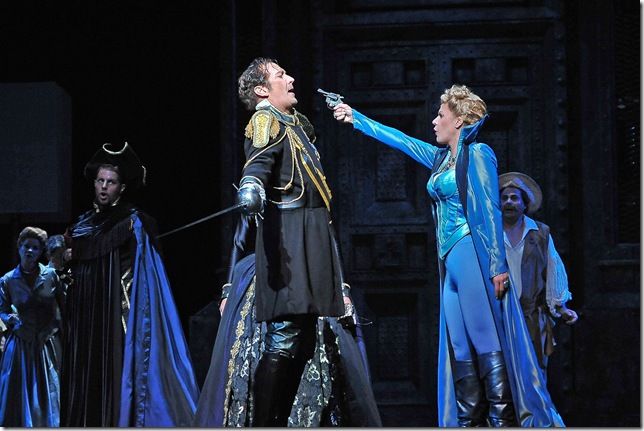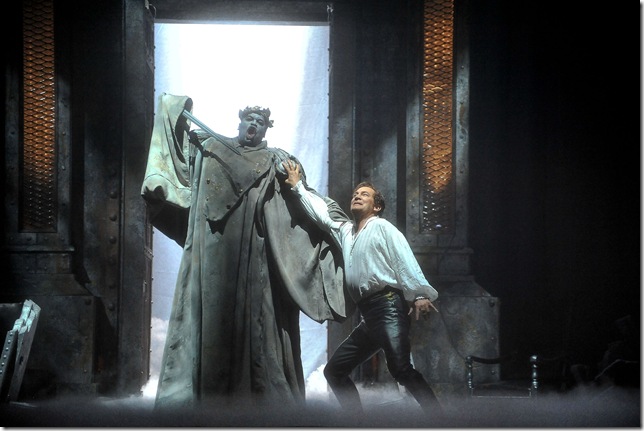FORT LAUDERDALE – More so than most operas, Don Giovanni presents its audience with a puzzle: Is it a tragedy or a comedy?
The Romantics of the 19th century saw it as an exercise in decadence and darkness, and until recently it was common to leave out the final scene, and end the opera with the licentious Don dragged screaming into Hell.
But surely seeing it as a comedy, if not quite a buffa one, is what its creators had in mind. A lighthearted story with a moral, but a moral its original audiences were always conscious of, and one that was the last gasp of the memento mori that was ever-present in the daily life of the West until the Romantic era.
It’s much easier to see that if Mozart’s opera is presented with laughs in mind, and director John Pascoe’s earthy, funny take on the score made for a successful, highly satisfying end to the Florida Grand Opera’s 70th season Saturday night at the Broward Center for the Performing Arts.
This Giovanni, set in some sort of mixed time frame of 18th-century Spain and 1950s Italian cinema, was full of busy, inventive movement, near-slapstick comedy and frank sexuality, most notably in the final banquet scene. There, the Don, whose onstage orchestra consisted of beautiful young women in nightwear, asks Donna Elvira to eat with him, then pointedly sticks his head between the legs of a leggy blonde in a camisole stretched out on the table.
A little much, perhaps, but it was the logical culmination of the very physical way the Don was portrayed all night, and it also was backed up by some fine singing and a first-class orchestra that beautifully rendered this marvelous score.
As Giovanni, the baritone David Pittsinger demonstrated good acting chops and a voice of an almost-conversational clarity and considerable strength. He was at his most affecting in moments such as his Deh vieni alla finestra, when he could let the warmer, lyric side of his voice show, and to excellent effect. He was a believable Giovanni, a handsome, slim man with plenty of money and confidence, and credible as an object of female desire, even if older than the libretto suggests.
Another fine lyrical male voice was that of tenor Andrew Bidlack as Don Ottavio, who in his two uxorious arias – Dalla sua pace and Il mio tesoro – sang with unforced loveliness and an exciting bigness that suggested a Pinkerton or Rodolfo in Bidlack’s future. He was not able to sustain that level throughout the opera, but he came close, and that this was his eighth performance in the role might have had something to do with it.
The two chief female leads in the all-American cast – sopranos Jacquelyn Wagner as Donna Anna and Georgia Jarman as Donna Elvira – also sang quite well throughout the night. Wagner has a high-floating, silvery quality to her strong voice that was most evident in her pretty, sensitive reading of Non mi dir in the closing moments of Act II.
Jarman’s brassier voice and more involved acting were very enjoyable to see and hear, and she showed real range in the way she led into her Mi tradí quell’alma ingrata: this was a woman in emotional pain, and she showed that dramatically by singing most of the recitative leading into it very softly – a risky move, but one that worked well.
Soprano Brittany Ann Renee Robinson, who like Wagner and Jarman was making her debut with FGO in this opera, made quite a good Zerlina. She has a lightly colored voice with a top that expands easily when more power is called for, and her Batti, batti and Vedrai, carino were tastefully and winningly sung.
Baritone Jonathan G. Michie, an excellent Ping earlier this season in FGO’s Turandot, was a mostly strong Masetto, though his voice lost heft toward the end of the evening. As Leporello, bass Tom Corbeil was great fun to watch, though less engaging musically; his voice was clear but underpowered throughout, which took away some of the vocal interest at crucial moments such as his side comments during his boss’ confrontation with the stone guest.
Bass Morris Robinson’s huge, creamy voice was excellently suited for his role as the Commendatore, and the stentorian way he sustained his notes made his singing sound like part of the trombone choir that accompanies his words in the graveyard scene.
Conductor Andrew Bisantz had a wonderful group of musicians at his disposal in the pit, and they played exceptionally well, with the kind of thorough polish that highlights all the things we admire about Mozart: his daring harmonies, splendid melodies and canny scoring, and above all his ability to bring the characters on stage alive in the orchestra.
Above all, it was Pascoe’s staging of this Washington National Opera production that made this Giovanni so much fun to see. Some of it didn’t quite work – the mobs looking for Giovanni at the beginning of Act II were shouting something stagy, and the women demons that circled the nobleman before he went through the door to perdition came off as hokey – but in most of it, Pascoe kept things busy and used all of his playing space in smart, entertaining ways.
One important pitfall that Pascoe avoided was the first half of the second act, which can come to a complete halt when all the arias from the Viennese version of the score are added in. Pascoe set them up in mini-tableaux; Elvira confesses her continuing love for Giovanni while occasionally clinging to a column for support, and Anna tells Ottavio that she must mourn her father while the two are staring at a giant, Hamlet’s father-style portrait of the dead Commendatore.
Pascoe’s moments of broader comedy – a mob does vaudeville’s slowly-I-turn shtick, and Leporello gets one over on Giovanni only to walk straight into a door jamb – were not out of place, and indeed, this was a Giovanni in which the house laughed loudly, and laughed often.
Marry that with superlative orchestral playing and a high level of singing that was usually good in solos and very fine in ensembles, and you had a Don Giovanni that knew what it was about, and in which the contrast between comedy and tragedy were not in conflict, but part and parcel of the same story – something, in fact, like life itself.
***
The 71st season of Florida Grand Opera will feature four productions, beginning Nov. 12-Dec. 3 with Federico Moreno Torroba’s zarzuela Luisa Fernanda, a first for this company. Puccini’s La Rondine, another first for FGO, is next (Jan. 21-Feb. 4), followed by Verdi’s Rigoletto (last staged in 2006, from Jan. 28-Feb. 18), and Gounod’s Romeo et Juliette (last seen in 2004, from April 21-May 12). For more information or for tickets, call 800-741-1010 or visit www.fgo.org.

